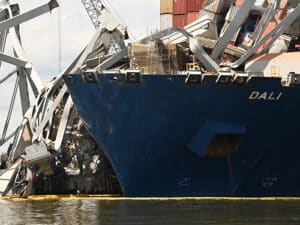
TSB Canada reports on fatal 2015 whale watching boat capsize
Written by Nick Blenkey
JUNE 14, 2017 — The Transportation Safety Board of Canada (TSB) issued three recommendations to improve passenger vessel safety resulting from its investigation (M15P0347) into the fatal October 2015 capsizing of the passenger vessel Leviathan II, owned by Jamie’s Whaling Station Ltd., in Clayoquot Sound, British Columbia.
On October 25, 2015, the Leviathan II was on a whale-watching excursion in the Plover Reefs area near Tofino, British Columbia, with 27 people on board. As the vessel was about to leave the area, a large breaking wave approached and impacted the vessel on the starboard quarter. The vessel broached and rapidly capsized, throwing all 24 passengers and three crew into the cold seawater without flotation aids. The subsequent rescue operation recovered 21 survivors. Six passengers died.
The investigation determined that the sea conditions in the area were favorable to the formation of breaking waves. However, none had been seen when the vessel first approached the area to observe sea lions. Moments after the master became aware of the large wave approaching the starboard quarter, he tried to turn the vessel to minimize the impact, but the wave struck the vessel before these actions could be effective. The crew did not have time to transmit a distress call before the capsizing, nor did the vessel have a means to automatically send a distress call. It was only by chance that the crew retrieved and activated a parachute flare, alerting nearby Ahousaht First Nation fishermen who arrived on the scene first, alerted search-and-rescue (SAR) authorities, and began recovering survivors from the water.
The Board’s first recommendation is that Transport Canada (TC) require commercial passenger vessel operators on the west coast of Vancouver Island to identify those areas and conditions conducive to the formation of hazardous waves, and adopt practical strategies to reduce the likelihood of an encounter (M17-01).
The Board is also recommending that TC require passenger vessel operators across Canada to adopt explicit risk-management processes that identify hazards and then implement proactive strategies to reduce these risks. These risk management processes should also be accompanied by comprehensive guidelines so that vessel operators and TC inspectors can implement and oversee them effectively (M17-02).
The TSB’s third recommendation is aimed at reducing response time in the event of an accident. It took 45 minutes after the capsizing before SAR authorities became aware of the capsizing. The TSB wants TC to require all commercial passenger vessels operating beyond sheltered waters to carry emergency position-indicating radio beacons (EPIRBs) or other similar equipment. These are designed to float free in the event of a capsizing or sinking and automatically transmit a continuous distress signal to SAR authorities (M17-03).





Leave a Reply
You must be logged in to post a comment.